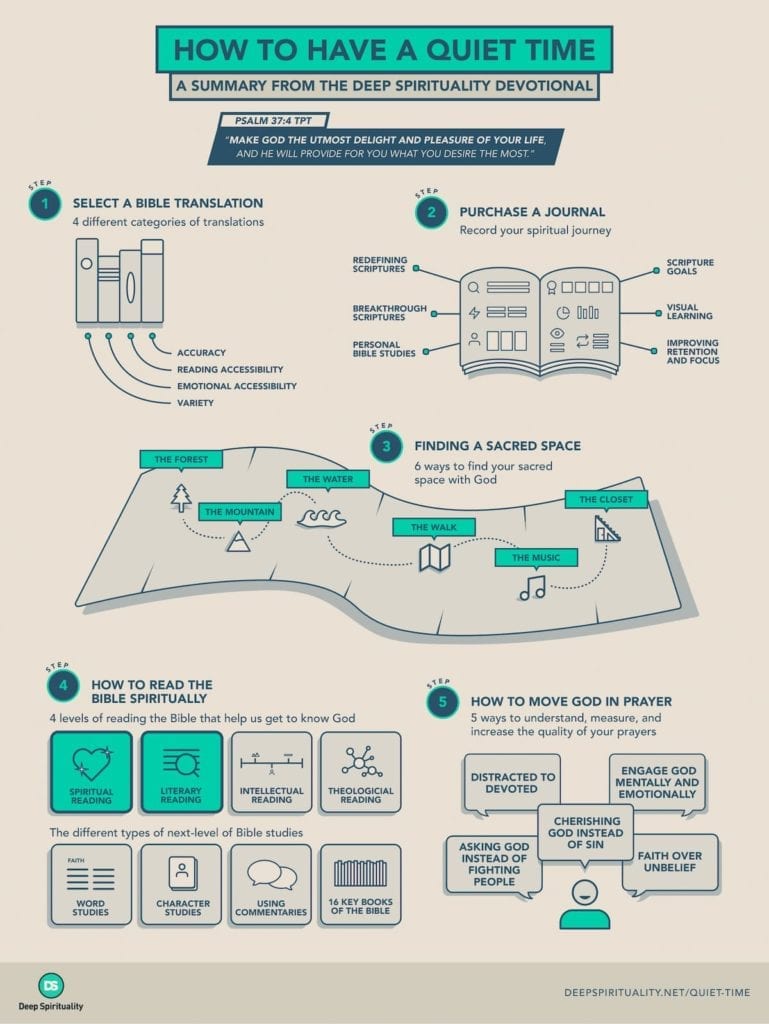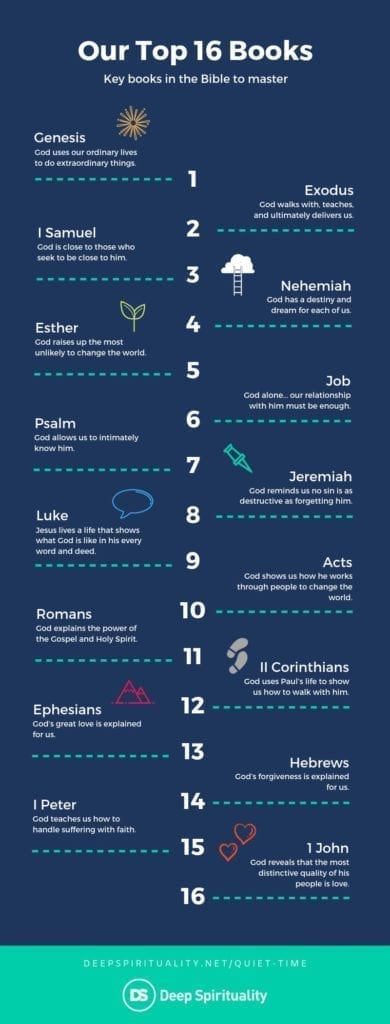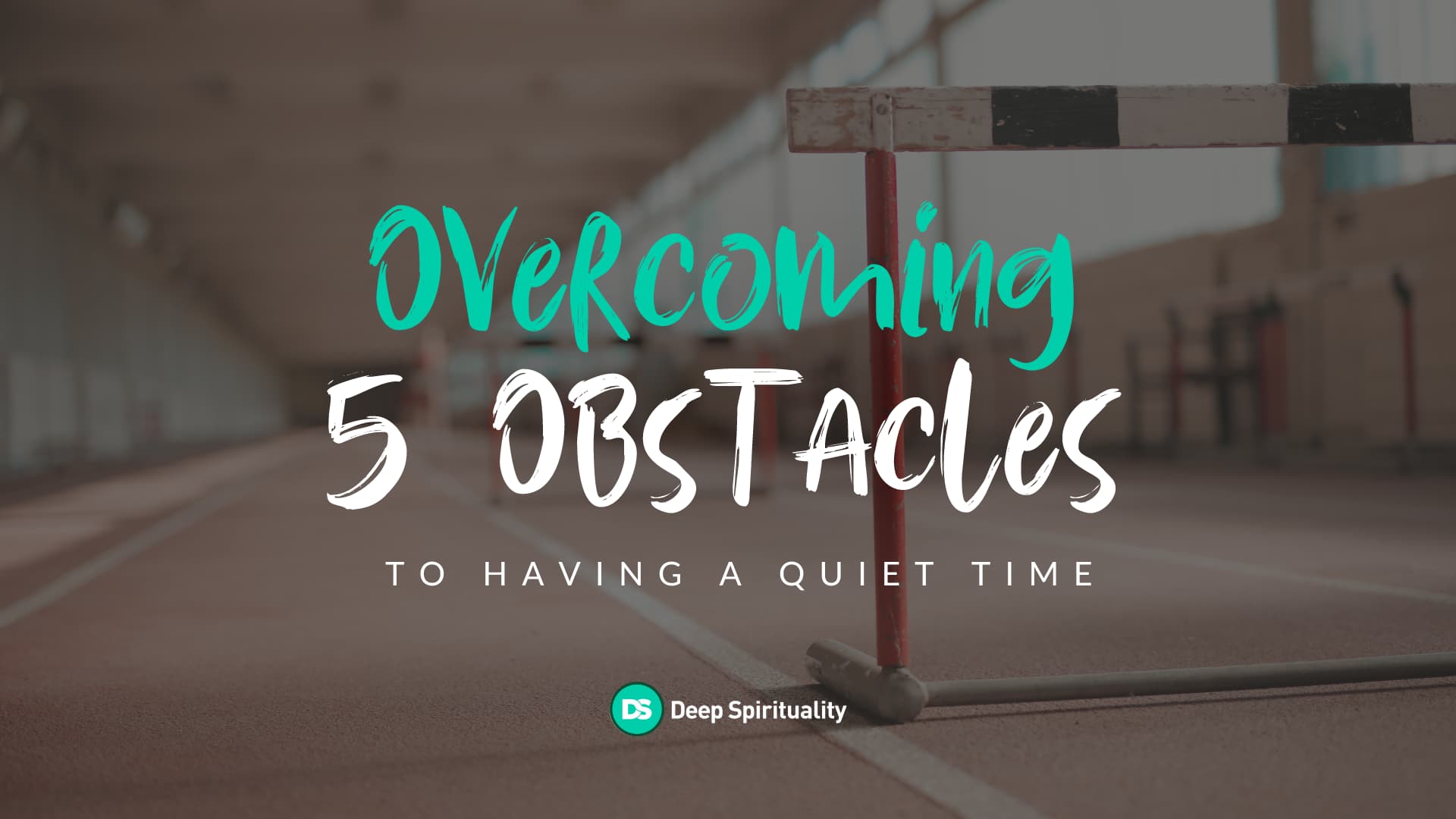Make God the utmost delight and pleasure of your life, and he will provide for you what you desire the most.
Psalm 37:4 TPT
There are four things I remember about spending the summer in Tennessee with my grandmother – two things that caused me distress and two that caused delight.
The red dirt that stained my clothes and the debilitating heat that sapped my soul were the sources of distress.
What were the two things that caused delight to my 9-year-old soul? They were two phrases previously unfamiliar to me. One evening my grandmother spoke these phrases in sweet resonance when she named “White Castle” and “Krispy Kreme” as the chosen destinations for our dinner.
These words had no meaning until we arrived at White Castle to enjoy the smallest and most delightful burger of my young life. The pickles, mustard, ketchup, onions, and speed with which I could evaporate one burger after another provided me with the utmost joy.
When we spend time alone with God, it should be the most delightful experience of our day – anticipated, cherished, and then savored.
How to Have a Quiet Time
Then we walked next door to the place called “Krispy Kreme” where I could see the Willy Wonka-like factory of delights producing what for me were the most extraordinary donuts I had ever smelled. When I saw and tasted the “chocolate frosted glazed donut,” it was a revelatory experience. My eyes were opened. Life became more delightful than ever before.
My experience and memory of my first “White Castle and Krispy Kreme” night still resides in my soul as one of the most delightful experiences of my young life, which is why I share this story.
When we spend time alone with God, it should be the most delightful experience of our day – anticipated, cherished, and then savored. Whether the day is good or bad, hard or easy, painful or pleasurable, it is our morning time with God that should help us sing with joy or endure with gritty determination.
This is what it means to have a quiet time with God. In the paragraphs that follow, my ambition is to share with you what I have learned from God and those whom he has sent into my life to teach me how to have a quiet time.
Selecting a Bible translation
So on the first day of the seventh month Ezra the priest brought the Law before the assembly, which was made up of men and women and all who were able to understand. [3] He read it aloud from daybreak till noon as he faced the square before the Water Gate in the presence of the men, women and others who could understand. And all the people listened attentively to the Book of the Law.
Nehemiah 8:2-3 NIV
They read from the Book of the Law of God, making it clear and giving the meaning so that the people understood what was being read.
Nehemiah 8:8 NIV
The Living Bible (TLB) was the first Bible I ever read. I was not a Christian, just a young kid attracted to an untraditional cover with live action photos and titled “The Way” instead of “The Bible.” What the King James Version failed to do, this unconventional volume achieved, as I began to read because of personal accessibility and not academic accuracy.
On one occasion I was speaking with a Christian publisher and shared this story, at which point he responded saying The Living Bible was the first Bible he ever read. The relevance of this story is that The Living Bible is a paraphrase, a translation often dismissed as inaccurate and useless.
Yet according to Wikipedia, “In 1972 and 1973, The Living Bible was the best-selling book in the U.S. By 1997, 40 million copies of The Living Bible had been sold.”
…the bragging rights of accuracy are meaningless without accessibility.
Selecting a Bible translation
I am not advocating everyone make The Living Bible their singular or primary translation, but that when selecting a translation of Scripture, the bragging rights of accuracy are meaningless without accessibility. In short, if I don’t understand it, if it fails to capture my attention, if it lacks clarity, and if I end up walking away without any idea of the meaning, then the Word of God will have no effect.
What follows are four categories of translations to get you started. Personally I use more than eight. But pick two if you can – one that is accessible and another that is accurate. Remember, you can select either print, digital, audio, or a DVD Bible.
Recommended for accuracy
- New Revised Standard Version
- English Standard Version
- New American Standard
Recommended for reading accessibility
- New International Version
- Good News Translation
Recommended for emotional accessibility
- New Living Translation
- God’s Word Translation
Recommended for variety
- Amplified Bible
- New King James
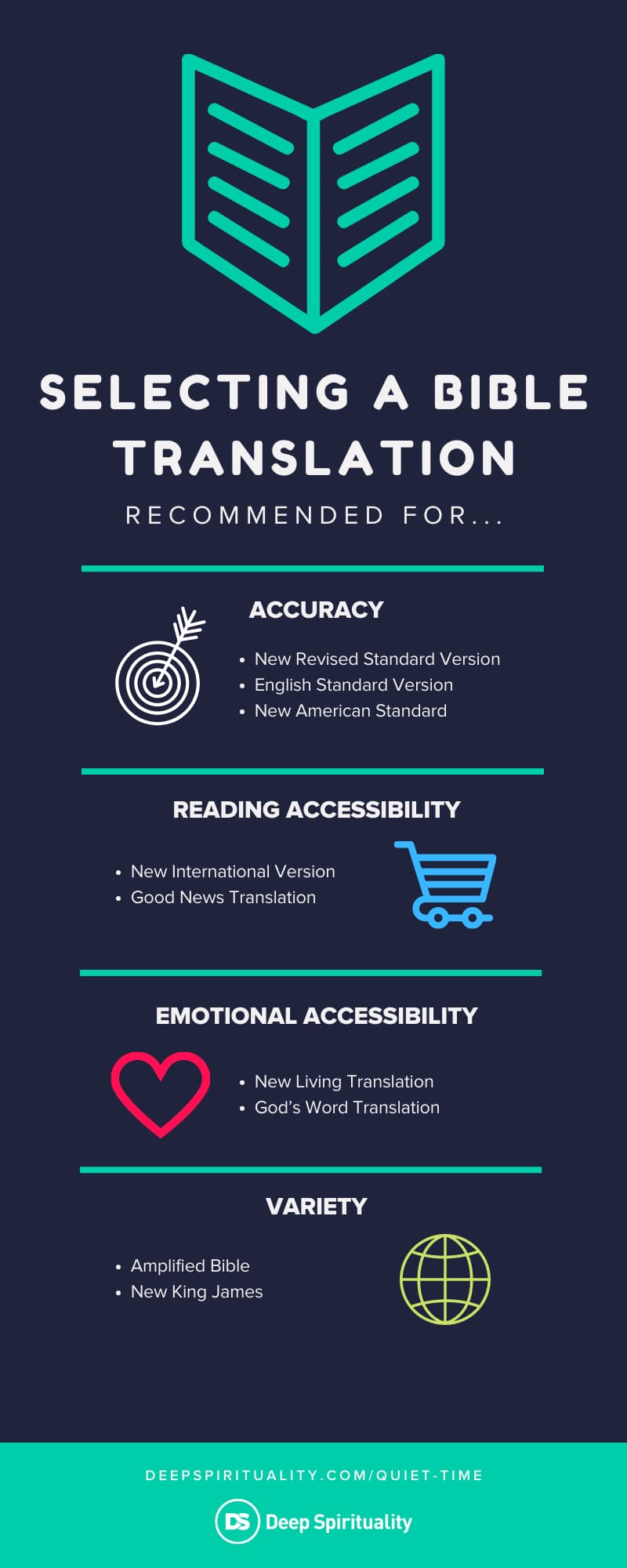
Purchasing a journal
Here are the stages in the journey of the Israelites when they came out of Egypt by divisions under the leadership of Moses and Aaron. [2] At the Lord’s command Moses recorded the stages in their journey. This is their journey by stages:
Numbers 33:1-2 NIV
Strawberries, a now defunct record store, was my favorite place to shop with my college friends for new music. I visited the Boston Kenmore Square location more times than I can count. But until I became a Christian, I never noticed there was a Christian bookstore next door. Once I became a Christian, I entered this novel shopping destination where I purchased my first leather-bound Bible and Christian music, and I discovered journals.
At first, I couldn’t see a reason to purchase a journal. Then I noticed other Christians taking notes while listening to sermons. They also whipped these journals out during conversations to remember insights, inspiring scriptures, and sometimes special moments. Eventually I decided to purchase a journal, and they have been a part of my quiet times ever since.
The purpose of my journal is to record the “stages of my journey” just as Moses spoke about in Numbers 33:1-2. The stages of my journey include the following:
- Redefining scriptures – Scriptures that help me reimagine my life, those that ignite my vision of the future so I can let go of the past.
- Breakthrough scriptures – Scriptures that help me break out of stagnating patterns and break free from being stuck.
- Personal Bible studies – These come from studying a book in the Bible, sometimes enhanced by a spiritual book or article I am reading. I try to find a personally applicable theme as I read. Something for me to learn that speaks to a spiritual need in my life (i.e. obedience, humility, faith). I select scriptures, create points or questions for myself, and then work daily to remember and obey the lessons learned. The great thing about these studies is that they are shareable; once shared, I have discovered they can inspire others to change just as they inspired me.
- Spiritual goals – There is no journey without a destination. My spiritual goals map out my journey; they are my roadmap. These can be as short as 7 days and as long as 10 years.
- Visual learning – There have been a host of influences which have encouraged me to use pictures, drawings, graphs, and a variety of other visual tools to make sure the things God is teaching me are imprinted on my heart. (For more on Visual Learning, check out ThoughtCo.’s The Visual Learning Style).
- Improving focus – Handwriting is increasingly rare. I have had people stop and compliment me when they see me writing by hand, as if they are seeing a Jedi Knight wielding his lightsaber. I am a believer in the power of handwriting for increasing focus, sustaining attention and improving retention. Dr. Perri Klaas supports this perspective in her New York Times column “Why Handwriting Is Still Essential in the Keyboard Age.”
- Improving retention – When I think about how to fulfill the command of Psalm 119:11, “I have hidden your word in my heart that I might not sin against you,” then I remember the monks who copied the Scriptures before we had the printing press. How incredible their retention was and ours can be if we will learn from and imitate them.
“The work of copying the Scriptures was undertaken in earnest in the monasteries in the Middle Ages. Several thousand monasteries were established across Europe, and for many of the monks making copies of the Scriptures was their chief task. They became the true guardians of the text and produced literally thousands of magnificent Bibles.
“How was the Bible distributed before the Printing Press,” Biblica
Teams of scribes and artists worked with parchment to produce incredibly beautiful works of art. A scribe taking dictation might use as many as 80 quills a day, and artists embellished the work with intricate designs and illustrations.”
You will notice I don’t use my journal for taking notes on sermons, nor do I use it for doing the journaling where people write out how they feel (this type of journaling can have positive and negative impacts).
I have a separate notebook for taking sermon notes. With regard to journaling emotions, I find it best to turn to God. God alone has the power to unearth hidden emotions and help us differentiate between those that are true and those that are false (Psalm 139:1-7, Jeremiah 17:5-9 NLT).
He is the one who helps us develop emotional awareness, emotional depth, and emotional discipline, which together make us emotionally strong (Ephesians 3:16 NIV). All of this happens in prayer, where God teaches us how to turn our powerful emotions into passion for his purposes (check out these articles on How to Pray, Deep Prayer, Empowered Prayer, and Defeating Darkness Though Prayer).


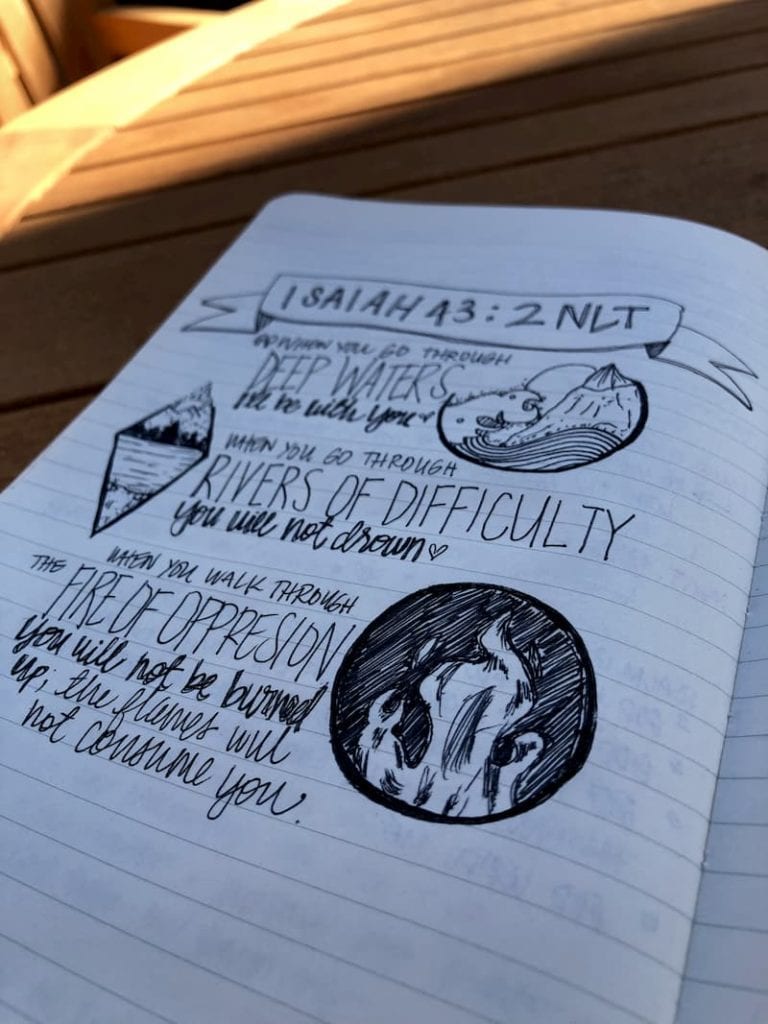
At this point, you are probably excited about purchasing a journal but wondering which type to purchase. Remember that a journal is personal, even emotional. Selecting the correct one can encourage intimacy with God and a deeper sense of attachment to the vision he has for your life. So think wisely and creatively, then take a look here to get a good look at a nearly perfect curation of journals.
Finding a sacred space
Be still. This is sacred time and space. Do not mourn.
Nehemiah 8:11 Voice
The phrase quiet time would indicate two things – there should be “quiet,” and we should devote “time.” In my experience, there has been more emphasis on time than quiet. This section on “Finding a sacred space” is meant to bring balance.
First of all, like any relationship, our intimacy with God will grow based on the amount of time we devote to the pursuit and building of the relationship. Thirty minutes is probably a good place to start: fifteen minutes of prayer and fifteen minutes of reading.
As we mature in our faith, this should grow to be at least an hour. On occasion we may have to adapt, breaking the hour into two 30-minute increments, once in the morning and then again in the evening. The key is to start where you can be successful and then incrementally increase the time.
Time invested is meaningless if we are distracted. The primary reason we become distracted in our time with God is because we have not selected a “sacred space” in order to truly start listening to God. We have failed to enter the “presence” and experience the “power” of the Father in his “sacred space.”
[5] The True God who inhabits sacred space is a father to the fatherless, a defender of widows. [6] He makes a home for those who are alone. He frees the prisoners and leads them to prosper. Yet those who rebel against Him live in the barren land without His blessings and prosperity. Psalm 68:5-6 Voice
There are six ways to find or create “sacred space.” Those who live in less populated areas will find “sacred space” more easily, but those in heavily populated areas can create their own “sacred space” even amidst the crowds. Here is how to do it.
Finding sacred space
- The forest – those who live outside cities will find that any wooded area can provide the stillness and peace necessary to meet God.
- The mountain – find an elevated spot overlooking your city, or simply a place to experience the peace, beauty and stillness of nature, and you will find yourself ushered into the “presence of God.”
- The water – there is nothing like a walk on the beach in the early morning, or a location overlooking a lake, perhaps a walk alongside a river. These prayers tend to be not only peaceful but reflective.
Creating sacred space
- The walk – If you live in the city, it is absolutely possible to map out an intricate and creative walk through the neighborhood. You will find that from 5 am until 8 am, most people are at home. So if you rise early and walk, you will find a peace similar to those in less populated areas.
- The music – Sometimes you find yourself in the midst of noise, especially when sitting in a café reading the Scriptures, which is why we provide playlists at Deep Spirituality. A great pair of headphones combined with one of these playlists will create “sacred space” even amidst the crowd.
- The closet – Remember Harry Potter. If he can live in a closet, then we can pray and read in one. If all else fails, create a closet in your backyard or a special table tucked into a corner. This with a cup of coffee and a favorite treat, and you will quickly find yourself transported to the heavenly regions.
How to read the Bible spiritually
Let me, your servant, walk in abundance of life that I may always live to obey your truth. [18] Open my eyes to see the miracle-wonders hidden in your word. [19] My life on earth is so brief, so tutor me in the ways of your wisdom.
Psalm 119:17-19 TPT
For whatever was written in former days was written for our instruction, so that by steadfastness and by the encouragement of the scriptures we might have hope.
Romans 15:4 NRSV
The Bible is a book about God. I have suffered much to learn this lesson. Reading it spiritually is not about being able to quote better, know more, be smarter, argue effectively, memorize more, or even gain comfort. The focus of Scripture is to know God.
Jesus replied, “Are you not in error because you do not know the Scriptures or the power of God?
Mark 12:24 NIV
The first Bible I ever purchased was for a college class called “Major Authors.” It was a paper-bound King James Bible. Despite the difficulty of accessibility presented by the archaic language, my professor, a visiting scholar from the University of Michigan (Go Blue), made it come alive (despite having no apparent faith in God).
They asked each other, “Were not our hearts burning within us while he talked with us on the road and opened the Scriptures to us?”
Luke 24:32 NIV
What that literature class taught me about making the Bible come alive has remained with me to this day. I have worked hard to develop this literary style of reading Scripture, which has deepened my capacity to read it spiritually. The result has been God’s Word “burning within,” so that my eyes open to his will and plans (Amos 3:7 NIV).
Decades since that literature class, my spiritual journey with God has taught me that reading the Bible is a multilayered endeavor involving four levels of experience:
- Spiritual reading – pursuing the spiritual meaning for faith and the heart to please God
- Literary reading – finding emotional and visual inspiration in the language of Scripture
- Intellectual reading – learning about Biblical time, place, culture, and history
- Theological reading – academic studying of religious ideas, doctrine, and concepts of God
What I have attempted to do is place these types of reading in order of greatest value for those attempting to live the Christian life, as opposed to becoming a leader or teacher. For this purpose, the foundation of building a great relationship with God is #1 and #2 above.
After we learn to consistently connect with and obey God, we can carefully add #3 and #4, always on the lookout for spending more time analyzing than being obedient to Scripture.
[39] “You are busy analyzing the Scriptures, frantically poring over them in hopes of gaining eternal life. Everything you read points to me, [40] yet you still refuse to come to me so I can give you the life you’re looking for – eternal life! John 5:39-40 TPT
There was a time when I would have prioritized “Intellectual” and “Theological” ahead of “Spiritual” and “Literary,” but 30 years of ministry has taught me that those who begin there usually lose their interest in Scripture. This probably accounts for the dismal discovery of Pew Research Center regarding the disinterest in Scripture reflected in the graph below.
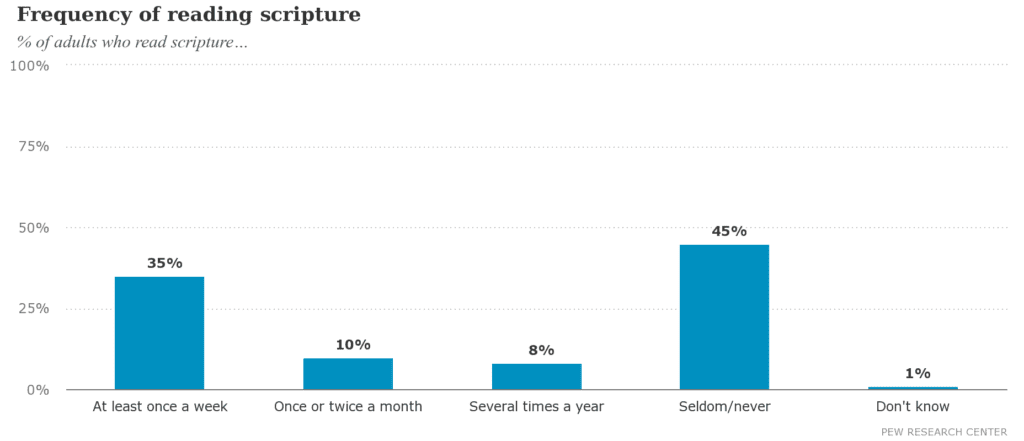
In short, if you follow the levels 1 to 4, then there is a greater likelihood you will read the Scriptures daily, which as you can see from the chart above is rare. Rare is what it means to be spiritual, to pursue God at an exceptional level with a unique devotion like Ezra.
For Ezra had devoted himself to the study and observance of the Law of the Lord, and to teaching its decrees and laws in Israel.
Ezra 7:10 NIV
Once we become inspired by our daily spiritual and literary reading of Scripture, then we can seek greater encouragement, depth, and knowledge by remembering these four tips for next-level Bible study.
Word studies
The easiest way to create a word study is to purchase a digital Bible, place your word of choice in the search box, press enter, and then read each scripture to get insight into the particular word.
An example would be to search “faith,” then go through each of the scriptures to gain a better understanding of faith.
Character studies
The value of a character study is that we find a person in Scripture we can relate to, learn from, and become inspired by in our walk with God. This study is accomplished by using a digital Bible to search for the name (i.e. Jacob or Mary).
Following this, beginning with the first chapter where you find their name, read every ensuing chapter until you have read all of what the scriptures have to say about them.
Commentaries
Bible commentaries and dictionaries help make sure we are not merely forcing the Word to mean what we want it to mean. They take into consideration the views of several scholars to provide background on actual word meaning, cultural factors, history, etc.
We don’t have to agree with these scholars; after all, they are human like us. But consulting them helps us understand whether we are being uniquely insightful or are simply out to lunch.
Top 16 books to master
This is a hard list to create, but I want to especially help early readers know the key books for knowing God, becoming spiritual and achieving spiritual growth.
- Genesis – God uses our ordinary lives to do extraordinary things.
- Exodus – God walks with, teaches, and ultimately delivers us.
- I Samuel – God is close to those who seek to be close to him.
- Nehemiah – God has a destiny and dream for each of us.
- Esther – God raises up the most unlikely to change the world.
- Job – God alone… our relationship with him must be enough.
- Psalm – God allows us to intimately know him.
- Jeremiah – God reminds us no sin is as destructive as forgetting him.
- Luke – Jesus lives a life that shows what God is like in his every word and deed.
- Acts – God shows us how he works through people to change the world.
- Romans – God explains the power of the Gospel and Holy Spirit.
- II Corinthians – God uses Paul’s life to show us how to walk with him.
- Ephesians – God’s great love is explained for us.
- Hebrews – God’s forgiveness is explained for us.
- I Peter – God teaches us how to handle suffering with faith.
- I John – God reveals that the most distinctive quality of his people is love.
These methods should keep you engaged and excited. If you find yourself in the “disinterested” camp when it comes to being motivated to spend time with God in the morning, check out this devotional entitled 10 Reasons We Quit Having Quiet Time With God:
How to move God in prayer
While I was speaking and praying, confessing my sin and the sin of my people Israel and making my request to the Lord my God for his holy hill— [21] while I was still in prayer, Gabriel, the man I had seen in the earlier vision, came to me in swift flight about the time of the evening sacrifice.
[22] He instructed me and said to me, “Daniel, I have now come to give you insight and understanding. [23] As soon as you began to pray, a word went out, which I have come to tell you, for you are highly esteemed. Therefore, consider the word and understand the vision… Daniel 9:20-23 NIV
One of the most challenging things about prayer is believing it makes a difference. This is why I love Daniel 9:20-23, where we are given an inside view of what can happen when we pray in a way that moves God.
The curtain on the heavenly action in response to Daniel’s prayer is drawn back, and we learn that, while he was still in prayer, the angel Gabriel was being sent to him in swift flight. Then Gabriel says, “As soon as you began to pray, a word went out, which I have come to tell you, for you are highly esteemed.”
There are two invaluable lessons about prayer in this passage. The first is that God moves into action when we pray. The second is that the action is uniquely powerful when we are highly esteemed by God. In short, our power to move God in prayer is based on the quality of our relationship with him.
Here are five ways to understand, measure, and increase the quality of our relationship with God so that when we pray, heaven moves (Psalm 20:6 CEV):
Learning to be devoted, not distracted
Their leader will be one of their own; their ruler will arise from among them. I will bring him near and he will come close to me—for who is he who will devote himself to be close to me?‘ declares the Lord.
Jeremiah 30:21 NIV
Quiet times were hard for me initially. Whenever I slowed down to read and pray, it was usually the only time I slowed down. So all my anxious thoughts came rushing to the surface. Every possible worry from upcoming class assignments, errands I needed to run, people I wanted to see, people I didn’t want to see, people I was afraid of, fun I wanted to have, money I needed, dreams I wanted to come true, and a host of other invading thoughts left me distracted from God.
My quiet times drifted between being worry times, to planning times, to people-focused times, and on and on. There was very little devotion and it showed in the weakness of my spiritual life. While time, maturity, increased spirituality, and age has seen me change, devotion remains a battle, because it is an everyday decision.
Every day I speak to people whose anxiety over life makes them cut their daily time with God short.
How to Move God in Prayer
What I have learned over the decades is that I am not alone. Every day I speak to people whose anxiety over life makes them cut their daily time with God short, or their preoccupation with people leaves them focused on a person while ignoring God. Some people fall asleep during prayer; others “people watch” during their quiet time Bible study; and still others, while using their digital Bible, switch apps to go shopping on Amazon.
The first and most important decision we must make to improve the quality of our relationship with God is to be devoted. This means removing every distraction by deciding God is more important. Here are three simple things we can do:
- Make an appointment – Put God in your schedule as an appointment. If someone calls, texts, or otherwise engages you, make sure you let them know you are in an appointment. If they approach you in person, tell them you have work to complete and would like to speak with them later.
- Keep a to-do list – Keep a pad of paper or smartphone app available during your daily quiet time, so that as soon as a worry or concern comes up, you can write it down and leave it alone so you can focus on God.
- Don’t let people crowd out God – One of the reasons we end up thinking about people more than God in our quiet time is because that is what we do throughout the day. Remember this, if we spend all day worrying about or trying to impress people, then by the time we begin our quiet time, they will be on our mind and not God. Whatever consumes our minds will dominate our quiet times. Replace consuming thoughts about people with passionate thoughts about God and watch your relationship with God soar.
Learning to engage God mentally and emotionally
Now prepare yourself mentally and emotionally to follow the Eternal One your God. Go and build the temple of the Eternal God, so you may bring the covenant chest of the Eternal to rest there and take the holy vessels of God into His house for us to use in sacrifice.
1 Chronicles 22:19 Voice
Once you have made the decision to be devoted, it is time to engage God. This means getting mentally and emotionally focused, attentive, and settled in the sanctuary of his presence and power.
For us to become mentally engaged, we must develop a conviction about clearing our mental clutter, which includes any thoughts so consuming we can’t think of God.
This means taking time out to think about God’s presence and power – that he is with us at all times, how he is working in our lives, acknowledging answered prayers, or simply talking to him throughout the day about a beautiful morning or a tasty cheeseburger. This is what it means to make room for God in our mind.
In his pride the wicked man does not seek him; in all his thoughts there is no room for God.
Psalm 10:4 NIV
Engaging God with our emotions depends on our emotional awareness, honesty, and depth. One of the greatest obstacles to engaging prayer comes when we settle for engaging our mind in Bible study but resist engaging our emotions in prayer. The Psalms provide a wonderful blueprint for how to express and deal with our emotions in prayer.
With a broken heart, I remember times before when I was with Your people. Those were better days. I used to lead them happily into the True God’s house, Singing with joy, shouting thanksgivings with abandon, joining the congregation in the celebration.
[5] Why am I so overwrought? Why am I so disturbed? Why can’t I just hope in God? Despite all my emotions, I will believe and praise the One who saves me and is my life. [6] My God, my soul is so traumatized; the only help is remembering You wherever I may be; From the land of the Jordan to Hermon’s high place to Mount Mizar. Psalm 42:4-6 Voice
There are four lessons we can learn about engaging God emotionally from these verses in Psalm 42.
- Are you heartbroken? Examine and acknowledge the condition of your heart. Is it receptive or resistant, soft or hard, broken or healed? Talk to God until you can get your heart in a right, whole, and peaceful state before him.
- Are you happy? Talk to God about whether you feel happy or sad spiritually. The goal is to be happy, but the road to happiness is often filled with grief, suffering, and pain. Prayer is about getting through the difficult to get to the happiness.
- Why so disturbed? We have all had our day ruined by emotional disturbances. Instead of gutting it out or trying to forget, we should engage these emotions and work through them with God.
- “Despite all my emotions…” One of the most important and powerful things about prayer is the ability it gives us to be emotionally disciplined. Prayer helps us stop being ruled by our emotions so we can live by our convictions.
The problem of cherishing sin instead of cherishing God
Come and hear, all you who fear God; let me tell you what he has done for me. [17] I cried out to him with my mouth; his praise was on my tongue. [18] If I had cherished sin in my heart, the Lord would not have listened; [19] but God has surely listened and has heard my prayer. [20] Praise be to God, who has not rejected my prayer or withheld his love from me!
Psalm 66:16-20 NIV
David Brooks is one of our society’s foremost public intellectuals. He has garnered even more attention than usual because of his advocacy for our society to embrace what he calls a “humility shift.” He wrote about this in his book “The Road To Character,” but the first time I saw it was in his column “The Moral Bucket List.”
“We live in the culture of the Big Me. The meritocracy wants you to promote yourself. Social media wants you to broadcast a highlight reel of your life. Your parents and teachers were always telling you how wonderful you were. But all the people I’ve ever deeply admired are profoundly honest about their own weaknesses.
They have identified their core sin, whether it is selfishness, the desperate need for approval, cowardice, hardheartedness or whatever. They have traced how that core sin leads to the behavior that makes them feel ashamed. They have achieved a profound humility, which has best been defined as an intense self-awareness from a position of other-centeredness.”
David Brooks, The Moral Bucket List
This “humility shift” comes down to a willingness to acknowledge personal weakness and sin. Mr. Brooks has been a keen observer of our culture for decades, so when he points out the danger of removing the concept of sin, we can trust the danger is holistic and not merely religious.
In my view, the simmering cultural resentment toward Christianity over the last fifty years begins and ends almost entirely with the issue of sin. Certainly, some have used sin as a “social cudgel to advance political agendas,” but history teaches us that, with Christianity as the awakener of the American conscience, capitalism has been made safe for the world (For more read “Imagining a Virtuous Capitalism”).
…the Christian view of sin has benefits for both the spiritual and secular world
How to Move God in Prayer
For this reason, we cannot shy away from the topic of sin, because the Christian view of sin has benefits for both the spiritual and secular world. Christianity is the author of the American embrace of redemption, forgiveness, and the second chance.
Christianity stands apart in stating that Jesus is the Son of God and came to earth to die for our sins. Acts 2:37 (NCV) records the response of people who learn that Jesus has died for their sins as “they felt guilty.” Acts 5:28 (CSB) provides us with a negative reaction by people who said of Christians they are, “determined to make us guilty of this man’s blood.”
In case you are thinking these are the followers and not Jesus himself, remember John 15:22 (NIV) where Jesus says, “If I had not come and spoken to them, they would not be guilty of sin; but now they have no excuse for their sin.”
Examining sin shouldn’t be about giving ourselves a grade…
How to Move God in Prayer
Why is sin so significant? Isaiah 59:2 (NIV) answers this question when it says, “But your iniquities have separated you from your God; your sins have hidden his face from you, so that he will not hear.”
The problem is that when we “cherish sin,” we create distance between ourselves and God, limiting his capacity to work in our lives, creating doubt and unbelief born from overwhelming guilt, leaving our confidence in God shattered (Psalm 31).
There are two things we can do about this. The first is to stop becoming depressed, discouraged, or disillusioned by our sin or anyone else’s. Instead of allowing our emotions to send us into dark places, we need to allow the sin to lead us back to God in pursuit of his forgiveness, which is powerful enough to “make us completely clean from the evil we have done.”
So surely the blood sacrifice of Christ can do much more. Christ offered himself through the eternal Spirit as a perfect sacrifice to God. His blood will make us completely clean from the evil we have done. It will give us clear consciences so that we can worship the living God.
Hebrews 9:14 ERV
The second and final decision we must make is to attack sin with intensity at the point of temptation (James 1:13-15 NIV), the moment we see ourselves cherishing it, entering the deceived state – that point where we think it will satisfy us more than God (Hebrews 3:12-13 NIV).
Examining sin shouldn’t be about giving ourselves a grade, measuring our performance, or trying to arrive at some point of perfect behavior. Instead it should be the passionate effort to sustain a continual connection to and intimacy with God, by attacking sin at the point of entry or when it attempts to get a grip on us.
This will enhance our relationship with God as we embrace his complete forgiveness, learning to love and cherish him over and above the deceitful lures of the spiritual darkness, so we can experience the unfathomable depths of his love every day (Ephesians 3:14-19).
The problem of fighting people instead of asking God
[1] What causes fights and quarrels among you? Don’t they come from your desires that battle within you? [2] You desire but do not have, so you kill. You covet but you cannot get what you want, so you quarrel and fight. You do not have because you do not ask God. [3] When you ask, you do not receive, because you ask with wrong motives, that you may spend what you get on your pleasures. James 4:1-3 NIV
One of the simpler things we can do to improve our relationship with God is to stop fighting people and start asking God. Rather than become angry at, critical of, and even hating people for being obstacles, we should instead realize people are not significant or powerful enough to determine the outcomes of our lives.
What the Scriptures call on us to do is forgive people instead of fighting them (Matthew 18:35 NIV). Then, freed from our bitterness, we can ask God for help overcoming the obstacles to the beautiful life he has called us to live (Romans 8:28 Voice).
The power of faith instead of unbelief
[20] Now to him who is able to do immeasurably more than all we ask or imagine, according to his power that is at work within us, [21] to him be glory in the church and in Christ Jesus throughout all generations, for ever and ever! Amen.
Ephesians 3:20-21 NIV
The longer I am a Christian the more I realize how much unbelief I tolerate in my life. There have been countless hours of effort I have made to improve my relationship with God, only to experience powerlessness and frustration, moments where my dreams seem farther away than ever.
What I have realized is that if I do every one of the things in this compendium of ideas about “How to have a quiet time” without faith, I will simply become a very religious, well-behaved, rule-following Christian. Whenever I have done this, I have crumbled under the weight of performing. Maybe you can relate.
The final message for us is only to have faith in God – a faith that inspires us to pray and take action. Only this type of faith can provide us with the imaginative and innovative spirit capable of unleashing the Spirit of Christ in our lives, so God can do the wonders he longs to do in our lives. This alone will make our quiet times what our souls thirst for them to be.
As the editor in chief for Deep Spirituality, Russ Ewell writes, teaches, and innovates with his eyes on the future. His teaching is rooted in providing hope for those turned off by tradition and infused with vision for building a transformative church. His passion to inspire even the most skeptical to view God through fresh eyes can be found in his book, He's Not Who You Think He Is: Dropping Your Assumptions and Discovering God for Yourself.
As the editor in chief for Deep Spirituality, Russ Ewell writes, teaches, and innovates with his eyes on the future. His teaching is rooted in providing hope for those turned off by tradition and infused with vision for building a transformative church. His passion to inspire even the most skeptical to view God through fresh eyes can be found in his book, He's Not Who You Think He Is: Dropping Your Assumptions and Discovering God for Yourself.


Newsletter
The Chemistry Lab
by Russ Ewell
A weekly spiritual newsletter about wonder, discovery, and the creative journey of walking with God.
"*" indicates required fields
"*" indicates required fields

